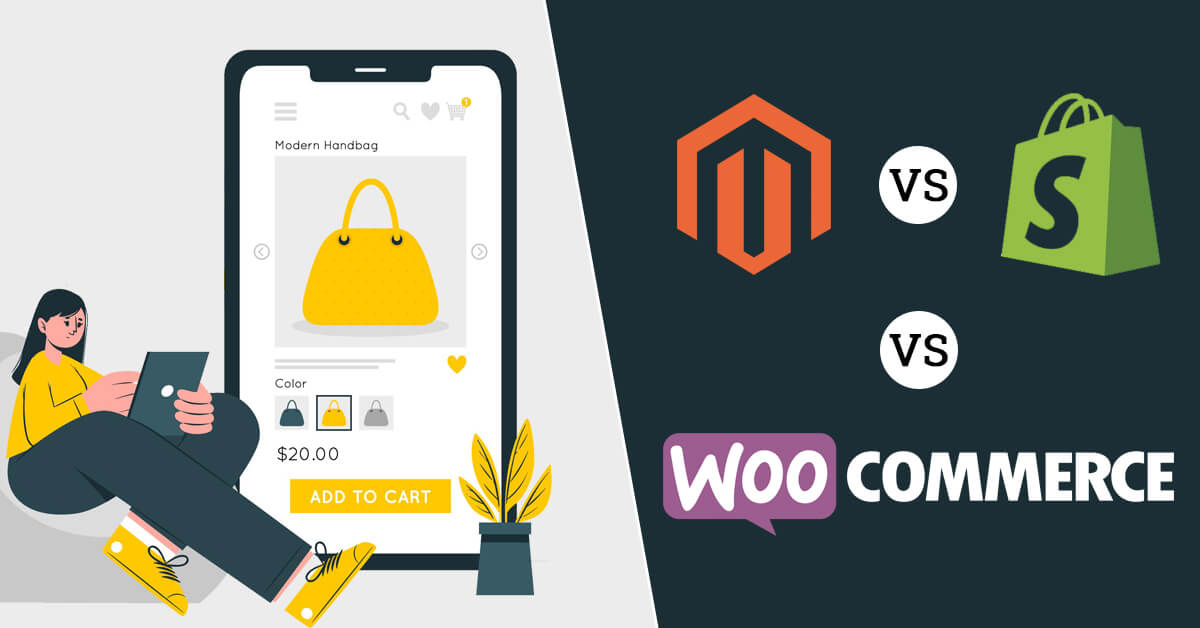
Thinking of launching an eCommerce store? Well, that’s a great idea! With global eCommerce reaching $26.7 trillion, fuelled by COVID-19, launching an eCommerce store is a profitable deal. However, when looking for eCommerce website development services, to launch your eCommerce store, the most crucial decision is to choose the most suitable eCommerce platform, as this could be one of the crucial factors that decide the success of your eCommerce store. This consideration becomes more essential for small businesses and startups as they have restricted budgets & resources.
Talking about the most preferable and suited eCommerce platforms, at present, we have the top three options: Shopify, WooCommerce, and Magento. Each of the platforms is packed with unique features and functionalities. To help you choose the best eCommerce platform for the startup, we have outlined all the details about these platforms and compared them, helping you choose the right one for your startup.
Top eCommerce platforms: Magento, Shopify, and WooCommerce
The eCommerce market is booming with opportunities. As e-retail revenues are projected to grow to 6.54 trillion in 2022, many people are keen on selecting the right platform and building a powerful and feature-packed eCommerce store. As of now, Magento, Shopify, and WooCommerce together power the majority of all eCommerce sites on the internet.
- WooCommerce is used by more than 4.4 million websites, with an eCommerce market of nearly 27.86% as of January 2021.
- Magento is being actively used by more than 250,000 merchants worldwide
- Shopify has over one million stores, and the number is constantly rising.
When developing an eCommerce store, most of the merchants are either using one of these platforms or are considering them for their eCommerce website and business.
Overview of the three platforms
Before we jump into the Magento vs Shopify vs WooCommerce debate, let’s have a brief introduction to these eCommerce giants:
Shopify: Launched in 2004, Shopify today is one of the most thriving and preferred eCommerce platforms. With Shopify, you can easily set up a functional eCommerce store. It offers a subscription-based basic plan that starts at $29 monthly. Shopify comes with amazing options for you to create limitless merchandise, have unlimited file storage, Google analytics integration, discount codes, 24/7 support, integration with social media platforms, multiple extensions, and much more! And the best part is, with Shopify you can also create custom solutions for your small businesses.
WooCommerce: With millions of websites using WooCommerce, it is amongst the leading eCommerce platforms. Since WooCommerce is an eCommerce plugin for WordPress, if you own a WordPress blog & are keen on selling something, this is preferably the best choice. In order to make your website effective, you can purchase and use a customized theme for your store and add extensions. With built-in WooCommerce features, you can get geolocation support, responsive design, Google analytics integration, SEO optimization, etc. If you go for paid WooCommerce plugins, you can add some advanced features, such as product comparison, quick browsing, pop-up notifications, different payment modes, and desired product listing, and more.
Magento: Magento CMS was launched in March 2008 and was later acquired by Adobe in 2018. The platform comes with several interesting built-in features that make it suitable for startups. With Magento, you can easily change languages and currencies, add coupons, apply discounts for the selected products, etc. For better store functionality Magento provides several extensions and templates. When you hire Magento developers, they can also make changes to the HTML or PHP code to display special features for your store.
Additionally, you can create multiple online stores and manage them with one admin panel.
Magento Vs Shopify Vs WooCommerce: Which is better?
Let’s compare the three platforms on the basis of:
1. SEO effectiveness
- Magento: The platform comes with advanced SEO functionalities with inbuilt and efficient analytics. It offers SEO-friendly, URLs, meta descriptions, and easy Google site maps integration which is auto-generated in websites. When you leverage Magento website development services, your developers can easily customize SEO functionalities as per your unique requirements. This implies that if you have your store developed on Magento, you can well-optimized your website and use SEO techniques to improve your store’s organic ranking.
- Shopify: this eCommerce platform is well-optimized for SEO. It comes up with great SEO-friendliness and features such as title tags, meta tags, ALT tags, image optimization, page URLs optimization, and the list goes on. However, the only problem is that you cannot experiment much with customizations.
- WooCommerce: Similar to Magento & Shopify, WooCommerce comes with SEO-friendly built-in functionalities. Furthermore, you can make use of multiple plugins and extensions available on WooCommerce, for great SEO performance. You can make customizations and tweak the settings as per your eStore’s requirements.
Winner: WooCommerce & Magento
2. Scalability & performance
- Magento: When it comes to scalability & performance, Magento is a great choice. It is an extremely powerful platform and can seamlessly allow you to enter multiple products. The platform is also capable of handling heavy website traffic, without affecting your store’s performance. Additionally, it is also extremely scalable, which implies that you can easily scale up or scale down your business whenever you want.
- Shopify: Shopify comes with a great website speed and performance. Since website speed plays a vital role in determining the success of any eCommerce website, therefore, Shopify is preferred by many for its increased website speed. However, when it comes to scalability, it falls short. So if you are a startup or have a small business, Shopify is great but it might pose a challenge for your organization if you’re looking to scale up on a large level. Nevertheless, for scalability, you can use Shopify Plus, but it will significantly raise the cost.
- WooCommerce: WooCommerce offers excellent performance. Using the platform, you can attain a good speed with any project size. Although WooCommerce enables scalability, you will have to take help from a reliable WooCommerce website development company to get developers who are familiar with coding and can meet your demand to scale up your website.
Winner: Magento
3. Community support
- Magento: With more than 300,000 members, the Magento platform holds a strong community. Even after your development process, if you have any issues, you can easily find Magento developers to get quick support. However, the platform’s direct customer support is not very prompt.
- Shopify: The platform provides impressive 24×7 customer support. In case of any issues, you can directly get in touch with customer support and seek help. Their customer support team is prompt in providing replies and solutions. Whenever required, you can reach their customer support service via live chat, email, phone, and even social media.
- WooCommerce: Since WooCommerce is a WordPress plugin, you get the benefit of a large WordPress community. If you want to enhance your eStore’s functionalities, you can make use of different codes or plugins created by others in the community. To handle critical issues, you can submit a user support ticket for WooCommerce to get the necessary help.
Winner: Shopify
4. Ease-of-use
- Magento: Magento is not easy to learn and use unless you have professional training. If you want to set up a high-performing store and manage it, you cannot do this alone. You will have to take help from Magento website development services or Magento experts to maintain your store. To manage Magento, you need to have knowledge of PHP, cloud hosting, HTML, etc.
- Shopify: Setting up, designing the store, and maintaining it is very easy with Shopify. To operate this platform, you need no prior knowledge of coding or website development. Shopify itself provides software and hosting itself. There are plenty of plugins and themes available that you can use.
- WooCommerce: Even WooCommerce comes with plenty of free themes and plugins that are easy to use. However, when you are in need to make customization as per your requirements, WooCommerce can get tricky, especially if you have no coding knowledge. In such cases, you will have to take help from WooCommerce customization service providers to get expert support.
Winner: Shopify
5. Customizability
- Magento: Amongst all the three platforms, Magento offers the most options for customizations. When you have a Magento expert on your side, you can make unlimited changes to the theme, features, SEO, layouts, and much more. You can customize your store as per your requirements and can have a unique website that lures the customers.
- Shopify: Though Shopify is easy to use, it does not provide much room for customization. If you choose to go with Shopify, you will have to use the core features of whatever theme you go with. For eg. If you want to integrate a new payment gateway that is not already installed in Shopify, the platform charges you an extra fee.
- WooCommerce: This platform also gives you room for customizations so that you can customize your eCommerce store and give it a unique look, just as you want. Leveraging WooCommerce development services, you can easily add or change the core features of your themes, create extensions or plugins, and do much more. If you are planning to customize your store without developers, you must have knowledge of CSS, PHP, HTML coding to make necessary changes.
Winner: Magento
6. Pricing plans
- Magento: Magento comes with two different price options i.e. community and enterprise. Its community version is free and easily available to download. But, the capabilities of this version are limited. For businesses that have limited budgets to spend, this becomes the best eCommerce platform for small businesses. On the other hand, the enterprise version of Magento is an ideal choice for medium- to large-sized organizations. The cost of this edition is not fixed and is determined by the size of the company.
- Shopify: If you are okay with paying a fixed fee, Shopify is the best option. The platform comes with three different pricing plans. The basic plan is $29 a month and is most suitable for startups or small businesses. The second plan is a standard plan that is $79 per month while the third one is an advanced plan which is $299 per month and includes all of the functionalities & capabilities. The platform also provides a 14-day free trial for businesses.
- WooCommerce: WooCommerce is free to use and can be easily downloaded from the WordPress website. Startups can ideally use this platform to build their online storefronts. However, while using WooCommerce you will have to pay for a domain name ($15 or more), an SSL certificate, and website hosting (around $120 per year). Furthermore, if you want to develop a robust online store, you will have to pay for third-party plugins to improve the functionality.
Winner: Magento
Conclusion
As you go through a detailed comparison between these three platforms you realize that all these platforms have their own sets of advantages and disadvantages. Depending on your unique requirements and priorities of how you want your eStore to look like and function, you can choose amongst the three of them. To make the right decision, just consider the broad criteria like cost, community support, performance, etc. Once you have a clear requirement in your mind, you can surely make the right decision.
Want to hire eCommerce developers for your project?
Whether you want to hire Magento developers, hire Shopify web programmers or hire WooCommerce developers, SunTec India provides a pool of expert eCommerce developers to help you build a high-performing, scalable, and responsive eCommerce store. By leveraging eCommerce website development services from SunTec India, you can get professional eCommerce web design solutions, cost-effective services, and great quality, all within a quick deadline.
Still, have doubts? Speak to our developers today. Write to us at info@suntecindia.com

